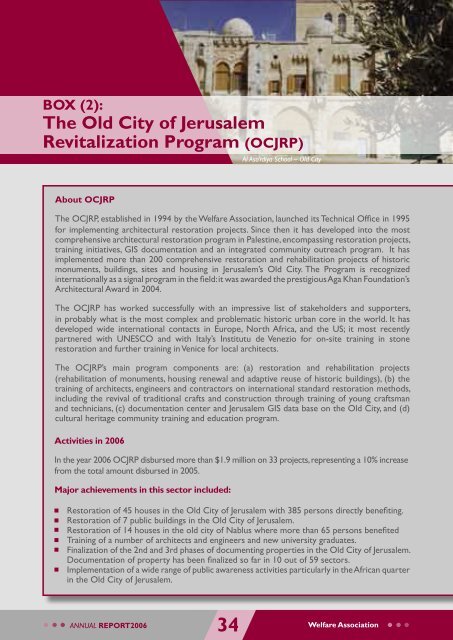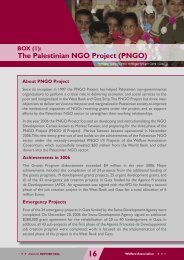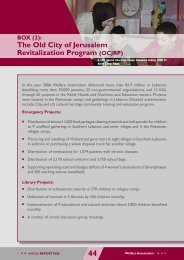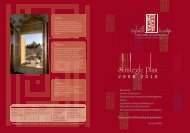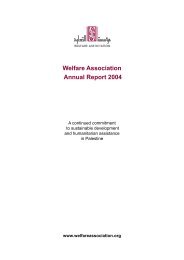Public Policy, Advocacy and Legal Rights Sector - Welfare - Welfare ...
Public Policy, Advocacy and Legal Rights Sector - Welfare - Welfare ...
Public Policy, Advocacy and Legal Rights Sector - Welfare - Welfare ...
You also want an ePaper? Increase the reach of your titles
YUMPU automatically turns print PDFs into web optimized ePapers that Google loves.
Al Asa’rdiya School – Old City<br />
About OCJRP<br />
The OCJRP, established in 1994 by the <strong>Welfare</strong> Association, launched its Technical Office in 1995<br />
for implementing architectural restoration projects. Since then it has developed into the most<br />
comprehensive architectural restoration program in Palestine, encompassing restoration projects,<br />
training initiatives, GIS documentation <strong>and</strong> an integrated community outreach program. It has<br />
implemented more than 200 comprehensive restoration <strong>and</strong> rehabilitation projects of historic<br />
monuments, buildings, sites <strong>and</strong> housing in Jerusalem’s Old City. The Program is recognized<br />
internationally as a signal program in the field:it was awarded the prestigiousAga Khan Foundation’s<br />
Architectural Award in 2004.<br />
The OCJRP has worked successfully with an impressive list of stakeholders <strong>and</strong> supporters,<br />
in probably what is the most complex <strong>and</strong> problematic historic urban core in the world. It has<br />
developed wide international contacts in Europe, North Africa, <strong>and</strong> the US; it most recently<br />
partnered with UNESCO <strong>and</strong> with Italy’s Institutu de Venezio for on-site training in stone<br />
restoration <strong>and</strong> further training in Venice for local architects.<br />
The OCJRP’s main program components are: (a) restoration <strong>and</strong> rehabilitation projects<br />
(rehabilitation of monuments, housing renewal <strong>and</strong> adaptive reuse of historic buildings), (b) the<br />
training of architects, engineers <strong>and</strong> contractors on international st<strong>and</strong>ard restoration methods,<br />
including the revival of traditional crafts <strong>and</strong> construction through training of young craftsman<br />
<strong>and</strong> technicians, (c) documentation center <strong>and</strong> Jerusalem GIS data base on the Old City, <strong>and</strong> (d)<br />
cultural heritage community training <strong>and</strong> education program.<br />
Activities in 2006<br />
In the year 2006 OCJRP disbursed more than $1.9 million on 33 projects, representing a 10% increase<br />
from the total amount disbursed in 2005.<br />
Major achievements in this sector included:<br />
Restoration of 45 houses in the Old City of Jerusalem with 385 persons directly benefiting.<br />
Restoration of 7 public buildings in the Old City of Jerusalem.<br />
Restoration of 14 houses in the old city of Nablus where more than 65 persons benefited<br />
Training of a number of architects <strong>and</strong> engineers <strong>and</strong> new university graduates.<br />
Finalization of the 2nd <strong>and</strong> 3rd phases of documenting properties in the Old City of Jerusalem.<br />
Documentation of property has been finalized so far in 10 out of 59 sectors.<br />
Implementation of a wide range of public awareness activities particularly in the African quarter<br />
in the Old City of Jerusalem.<br />
ANNUAL REPORT2006<br />
34<br />
<strong>Welfare</strong> Association
The Islamic Museum - Old City<br />
On November 30, 2006, <strong>Welfare</strong> Association held a fundraising benefit dinner in Dubai entitled<br />
“Jerusalem in our Hearts.” The $680,000 raised will support the Old City of Jerusalem Revitalization<br />
Program which aims to rehabilitate historical buildings, preserve cultural heritage <strong>and</strong> create a<br />
better quality of life for Jerusalem inhabitants. These funds will enable emergency repairs for more<br />
than 20 homes for multiple families providing healthy <strong>and</strong> safe shelter for more than 200 Old City<br />
residents.<br />
Another major achievement in 2006 was the signing of a three-year (2006-2009) agreement<br />
between the Swedish International Development Agency (Sida) <strong>and</strong> <strong>Welfare</strong> Association. Sida will<br />
provide $1.25 million for OCJRP for projects that aim at supporting the restoration of historic<br />
buildings <strong>and</strong> urban environments for the benefit of children <strong>and</strong> youth. The overall objective of<br />
the project is to contribute to the preservation <strong>and</strong> use of the historic environment of the Old<br />
City of Jerusalem.<br />
Successful negotiations were concluded to develop an Architectural Heritage Preservation Institute<br />
funded by the European Union through partnership with United Nations Educational, Scientific<br />
<strong>and</strong> Cultural Organization (UNESCO).<br />
The agreement was signed in December 2006 <strong>and</strong> the project implementation will commence<br />
in early 2007. The 3-year project aims to institutionalize a formal technical training program in<br />
international st<strong>and</strong>ards <strong>and</strong> practices in conservation to benefit architects, engineers, contractors<br />
<strong>and</strong> workers practicing in the field in Jerusalem.<br />
The training program will rely on OCJRP restoration projects as project sites for its practical<br />
training activities. The institute will also develop a specific information centre <strong>and</strong> data base for<br />
special monuments <strong>and</strong> historic sites in the Old City of Jerusalem.<br />
The <strong>Welfare</strong> Association plans to establish an endowment for the institute to ensure its<br />
sustainability <strong>and</strong> hopes to exp<strong>and</strong> <strong>and</strong> replicate this project in the future in other historic centers<br />
in Palestine.<br />
Three different high profile symposia on OCJRP <strong>and</strong> its achievements took place in 2006 in Sharjah<br />
<strong>and</strong> Kuwait, including a seminar entitled “Protecting Religious <strong>and</strong> Architectural Heritage in the<br />
Old City of Jerusalem” held in Kuwait <strong>and</strong> hosted by the Arab Fund for Economic <strong>and</strong> Social<br />
Development.<br />
ANNUAL REPORT2006<br />
35<br />
<strong>Welfare</strong> Association
Activities<br />
A Seminar Held by the Civic Coalition for Defending<br />
the Palestinians’ <strong>Rights</strong> in Jerusalem (CCDPRJ)<br />
<strong>Public</strong> <strong>Policy</strong>, <strong>Advocacy</strong> <strong>and</strong> <strong>Legal</strong> <strong>Rights</strong> <strong>Sector</strong><br />
Supporting citizens in attaining<br />
their humanitarian <strong>and</strong> legal rights<br />
<strong>Sector</strong> Overview<br />
WA support to the <strong>Public</strong> <strong>Policy</strong>,<br />
<strong>Advocacy</strong> <strong>and</strong> <strong>Legal</strong> <strong>Rights</strong> <strong>Sector</strong> aims at<br />
supporting Palestinian citizens in attaining<br />
their humanitarian <strong>and</strong> legal rights through<br />
awareness raising, legal aid, lobbying <strong>and</strong><br />
advocacy, <strong>and</strong> through the strengthening of<br />
institutions of local government.<br />
Three different but overlapping areas of need<br />
constituted the main foci for WA interventions<br />
in this sector, namely: 1) Human rights of<br />
Palestinians living in the 1948 areas, 2) <strong>Legal</strong><br />
rights of Palestinians living in annexed Jerusalem,<br />
<strong>and</strong> 3) Women rights in general.<br />
Palestinians living in the 1948 areas are<br />
considered <strong>and</strong> treated as second class citizens<br />
<strong>and</strong> are deprived of a broad spectrum of legal,<br />
humanitarian, <strong>and</strong> other rights. In the Naqab<br />
specifically, many Palestinians are living in what is<br />
called Unrecognized Villages, with no access to basic<br />
services or any other rights.<br />
Bedouin Residents of Unrecognized Villages in Naqab<br />
ANNUAL REPORT2006<br />
36<br />
<strong>Welfare</strong> Association
<strong>Public</strong> <strong>Policy</strong>, <strong>Advocacy</strong> <strong>and</strong> <strong>Legal</strong> <strong>Rights</strong> <strong>Sector</strong><br />
Palestinians living in Jerusalem have to<br />
contend daily with issues <strong>and</strong> practices<br />
that violate their basic <strong>and</strong> internationally<br />
recognized human rights. These issues include<br />
restrictions regarding building permits;<br />
property confiscation;settlement expansion;<br />
family dispersion; silent deportation of<br />
residents; poor quality of education <strong>and</strong><br />
health services; high taxation; restrictions<br />
on economic mobility; discrimination in<br />
the municipal services regarding garbage<br />
collection, safe <strong>and</strong> well-paved roads, lighting<br />
of roads; humiliating practices at the Israeli<br />
official departments; <strong>and</strong> the ramifications of<br />
the Israeli Apartheid Wall on all aspects of<br />
life.<br />
Progress made by Palestinian women<br />
concerning their health <strong>and</strong> educational status<br />
in recent decades has been quite impressive,<br />
however, gender disparities still exist in many<br />
official indicators of human development <strong>and</strong><br />
reflect the generally lower status of women<br />
compared to men. This can be seen in their<br />
employment sub-sectors, income share,<br />
positions <strong>and</strong> benefits; level of decision-making<br />
positions in business, politics, institutions, <strong>and</strong><br />
public life; access to loans; <strong>and</strong> in their treatment<br />
as workers, to women’s disadvantage.<br />
Furthermore, women’s status has regressed<br />
under the severe conditions of the intifada,<br />
primarily from the effects of increased poverty<br />
<strong>and</strong> associated economic <strong>and</strong> social pressure on<br />
families toward early school leaving, early marriage<br />
<strong>and</strong> early childbearing, <strong>and</strong> ab<strong>and</strong>onment. There<br />
has been an increasing prevalence of frustration<br />
<strong>and</strong> violence in society. In such circumstances,<br />
women are known to also be more vulnerable to<br />
discrimination, violence <strong>and</strong> social isolation.<br />
First Issue of the Newspaper Supplement “Sawt Al-Quds” Published by the<br />
Civic Coalition for Defending the Palestinians’ <strong>Rights</strong> in Jerusalem (CCDPRJ)<br />
<strong>and</strong> Circulated with Al-Quds Daily<br />
ANNUAL REPORT2006<br />
37<br />
<strong>Welfare</strong> Association
<strong>Public</strong> <strong>Policy</strong>, <strong>Advocacy</strong> <strong>and</strong> <strong>Legal</strong> <strong>Rights</strong> <strong>Sector</strong><br />
Activities in 2006<br />
In 2006, WA tried to address many of the areas of needs through the implementation<br />
of 10 different projects in the <strong>Public</strong> <strong>Policy</strong>, <strong>Advocacy</strong> <strong>and</strong> <strong>Legal</strong> <strong>Rights</strong> <strong>Sector</strong> with total<br />
disbursements equal to $442,823.<br />
Major achievements in this sector included:<br />
Naqab: In an attempt at improving the legal rights situation in the Naqab, 5 massive<br />
demonstrations against home demolition were conducted, grazing licenses for 560 sheep<br />
owners were obtained, legal counseling was provided to sheep owners, meetings with <strong>and</strong><br />
tours for Knesset members were conducted, a media campaign was conducted, 2 position<br />
papers were prepared, 30 legal cases <strong>and</strong> 4 High Court appeals were submitted.<br />
Jerusalem: A Citizens’ <strong>Rights</strong> <strong>Advocacy</strong> Bureau/ Forum (CAB) in East Jerusalem<br />
was established <strong>and</strong> was a major step towards improving the quality <strong>and</strong> relevance<br />
of the legal <strong>and</strong> human rights services provided to residents in East Jerusalem.<br />
CAB implemented a wide range of activities that included: Holding a conference<br />
on Palestinian citizens of Israel collective rights <strong>and</strong> status; Supporting human rights<br />
education programs; Organizing a conference on the Israeli Apartheid Wall around<br />
Jerusalem; Producing a monthly report on human rights violations in Jerusalem;<br />
Providing legal aid services to Palestinian residents in East Jerusalem; Participating in<br />
local public advocacy activities <strong>and</strong>; Holding the first coordination meeting with the<br />
1948 areas NGO’s Forum.<br />
Women: In addressing the needs of women, the Support for Community Empowerment<br />
of Women project was implemented in the West Bank <strong>and</strong> Gaza. The project aims to<br />
provide support to local NGOs providing services for girls <strong>and</strong> women to encourage<br />
them to seek recognition of their rights, to underst<strong>and</strong> <strong>and</strong> improve women’s role in the<br />
development of the society, <strong>and</strong> to find support in the community for seeking a better<br />
future. Project activities included: Preparing qualified women lawyers <strong>and</strong> social workers<br />
to provide legal <strong>and</strong> social advice where needed; Preparing a qualified cadre of women<br />
journalists to cover issues related to women <strong>and</strong> domestic violence; Training lawyers <strong>and</strong><br />
social workers in the field of women’s rights <strong>and</strong> domestic violence, <strong>and</strong>; Establishing<br />
support committees for women in different areas. In the year 2006, 60 female social<br />
workers were trained in identifying <strong>and</strong> addressing violence against women; 583 women<br />
participated in 22 awareness workshops, <strong>and</strong> 11 female lawyers were trained in fields<br />
related to domestic violence.<br />
ANNUAL REPORT2006<br />
38<br />
<strong>Welfare</strong> Association
<strong>Public</strong> <strong>Policy</strong>, <strong>Advocacy</strong> <strong>and</strong> <strong>Legal</strong> <strong>Rights</strong> <strong>Sector</strong><br />
Projects <strong>and</strong> Expenditure According to<br />
Geographic Location:<br />
In 2006, 5 projects were implemented in the West Bank<br />
with a corresponding disbursement of $332,027. In the<br />
1948 areas three projects were implemented with total<br />
expenditure of $72,396. The total disbursement in Gaza<br />
was $38,400 spent on two projects.<br />
Projects <strong>and</strong> Expenditure According to Sub-<strong>Sector</strong>:<br />
In 2006, eight projects were implemented in the<br />
sub-sector of <strong>Legal</strong> Aid (LA) with a corresponding<br />
disbursement of $268,673. These projects provided<br />
funds to women empowerment programs, public<br />
awareness campaigns <strong>and</strong> providing legal aid to East<br />
Jerusalem residents. Another area of interest for the<br />
<strong>Welfare</strong> Association is the sub-sector <strong>Public</strong> <strong>Sector</strong><br />
Institutions Development (PSID) where $174,150 was<br />
spent on 2 projects mainly providing local government<br />
institutions with necessary equipment.<br />
2006 PUBLIC POLICY, ADVOCACY, AND LEGAL RIGHTS PROJECTS – BENEFICIARIES LIST<br />
West Bank:<br />
Establishing the civic coalition for defending the Palestinians’ rights in Jerusalem: Civic Coalition for Defending the<br />
Palestinians’ <strong>Rights</strong> in Jerusalem <strong>Legal</strong> empowerment: Residents of the West Bank Procurement <strong>and</strong> installment<br />
of electrical generator: Yabad Municipality – Jenin Women empowerment program: Women’s Affairs Technical<br />
Committee<br />
Gaza:<br />
Providing municipalities with vehicles <strong>and</strong> equipment: Rafah Municipality Women empowerment program-Gaza:<br />
Palestinian Center for Human <strong>Rights</strong><br />
1948 Areas:<br />
Conference on Palestinian citizens of Israel: Arab Center for Applied Research – Haifa Human rights education<br />
program: Arab Association for Human <strong>Rights</strong> – Nazareth Naqab empowerment program: Adalah-<strong>Legal</strong> Center for Arab<br />
Minority <strong>Rights</strong> in Israel<br />
ANNUAL REPORT2006<br />
39<br />
<strong>Welfare</strong> Association
Activities<br />
Needy Children Provided with Sweaters in Gaza<br />
Relief <strong>Sector</strong><br />
Responding to ensure the survival,<br />
protection, <strong>and</strong> well-being of<br />
Palestinians during emergencies<br />
<strong>Sector</strong> Overview<br />
As a result of continued occupation,<br />
Palestinians face incursions, siege, demolition<br />
of houses <strong>and</strong> public properties, severe<br />
shortages in food <strong>and</strong> medications <strong>and</strong> other<br />
life essentials, skyrocketing unemployment,<br />
<strong>and</strong> deep poverty as daily occurrences in<br />
Palestinian society. Life for Palestinians under<br />
occupation has always been characterized as a<br />
chronic emergency.<br />
Food Distribution in Gaza<br />
ANNUAL REPORT2006<br />
Since its establishment WA has always tried to<br />
respond to the urgent needs of the population. It<br />
has mobilized resources over the years to support<br />
a large number of programs to make health care,<br />
food, relief <strong>and</strong> jobs available for the population in<br />
crises, especially in high-risk localities. Direct <strong>and</strong><br />
humanitarian aid efforts have included emergency<br />
employment to raise household income, food<br />
assistance, tuition credits for university students,<br />
relief for families experiencing social hardships, <strong>and</strong><br />
housing assistance for families whose homes were<br />
damaged or destroyed. In addition, WA has undertaken<br />
a wide range of agricultural relief programs as well<br />
medical emergency programs, mainly providing urban<br />
<strong>and</strong> rural hospitals <strong>and</strong> clinics with medications <strong>and</strong><br />
medical supplies.<br />
40<br />
<strong>Welfare</strong> Association
Relief <strong>Sector</strong><br />
WA’s main aim in the Emergency Relief <strong>Sector</strong> is to respond to emergencies that put at<br />
great risk the survival, protection, <strong>and</strong> well-being of Palestinians. The groups targeted are the<br />
poorest, most marginalized <strong>and</strong> needy families, as well as those who have lost their livelihood<br />
<strong>and</strong> shelter due to the wars <strong>and</strong> military incursions <strong>and</strong> occupation policies <strong>and</strong> practices.<br />
Activities in 2006<br />
In the year 2006, <strong>Welfare</strong> Association implemented 36 different projects in the Emergency<br />
Relief <strong>Sector</strong> with disbursements equal to around $3.5 million. Around 340,000 persons<br />
benefited from these emergency relief programs.<br />
Major achievements in this sector included:<br />
Provision of Shelter: 45 emergency shacks sheltering over 400 inhabitants were built<br />
for the Bedouin whom homes were demolished in Al Naqab in the 1948 Areas.<br />
Cash Provision to Needy Families: Around 180,000 persons from 30,000 needy<br />
families were provided with cash support in the West Bank <strong>and</strong> Gaza Strip as part of<br />
WA’s Family to Family Program funded by WA’s Support Committee in Dubai. Another<br />
2,000 families benefited from a similar program financed by the Arab Fund.<br />
Provision of Clothes <strong>and</strong> Other Essentials: Around 20,000 needy school children<br />
were provided with woolen sweaters, almost all from the Gaza Strip<br />
Food <strong>and</strong> Water Provision: Around 10,000<br />
needy persons, mostly children, benefited<br />
from more than $100,000 spent in Gaza on<br />
food parcels <strong>and</strong> hot meals. An estimated<br />
30,000 persons benefited from $690,000<br />
spending on food <strong>and</strong> other basic supplies<br />
in Palestinian refugee camps <strong>and</strong> unofficial<br />
gatherings in Lebanon following the Israeli war<br />
The population of six villages (over 100,000<br />
persons) in Southern Lebanon had access to<br />
drinking water as a result of the provision of<br />
electrical generators to needy municipalities<br />
[See Box 3].<br />
Projects <strong>and</strong> Expenditure According to Geographic Location:<br />
In 2006, there was a total of 36 relief projects. Due to emergency situations, Gaza <strong>and</strong> Lebanon<br />
had the highest number of relief projects implemented (18 in Gaza <strong>and</strong> 9 in Lebanon).<br />
Almost $1 million was spent in Lebanon in the aftermath of the war, mainly in the form of<br />
food aid <strong>and</strong> other essentials, including electric generators to the southern towns to provide<br />
drinking water. This is the first time that WA, based on a Board of Trustees directive, decided<br />
ANNUAL REPORT2006<br />
41<br />
<strong>Welfare</strong> Association
Relief <strong>Sector</strong><br />
to extend its operations to serve Lebanese villages in<br />
addition to its regular operation within the Palestinian<br />
refugee camps in Lebanon. However, reflective of its<br />
large area <strong>and</strong> population, the West Bank represented<br />
the highest spending, more than $1.3 million, the<br />
majority of which was in cash aid to needy families.<br />
Projects <strong>and</strong> Expenditure According to Sub-<strong>Sector</strong>:<br />
Of the 36 total projects implemented, 22 provided<br />
mainly food parcels to families, at a value of $1 million.<br />
The majority of spending in the sector was in the<br />
form of cash support mainly through WA’s Support to<br />
Needy Families Program. Five projects provided clothes<br />
<strong>and</strong> other basic essentials mainly in Gaza where need<br />
was greatest. About $120,000 were spent mainly in<br />
providing woolen sweaters <strong>and</strong> other clothing especially<br />
to children.<br />
ANNUAL REPORT2006<br />
40<br />
<strong>Welfare</strong> Association
Carnival Day, Beqa'a Valley - Lebanon


